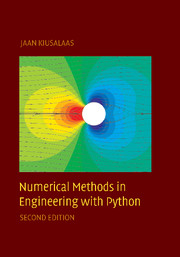Book contents
- Frontmatter
- Contents
- Preface to the First Edition
- Preface to the Second Edition
- 1 Introduction to Python
- 2 Systems of Linear Algebraic Equations
- 3 Interpolation and Curve Fitting
- 4 Roots of Equations
- 5 Numerical Differentiation
- 6 Numerical Integration
- 7 Initial Value Problems
- 8 Two-Point Boundary Value Problems
- 9 Symmetric Matrix Eigenvalue Problems
- 10 Introduction to Optimization
- List of Program Modules (by Chapter)
- Index
Preface to the Second Edition
Published online by Cambridge University Press: 05 June 2012
- Frontmatter
- Contents
- Preface to the First Edition
- Preface to the Second Edition
- 1 Introduction to Python
- 2 Systems of Linear Algebraic Equations
- 3 Interpolation and Curve Fitting
- 4 Roots of Equations
- 5 Numerical Differentiation
- 6 Numerical Integration
- 7 Initial Value Problems
- 8 Two-Point Boundary Value Problems
- 9 Symmetric Matrix Eigenvalue Problems
- 10 Introduction to Optimization
- List of Program Modules (by Chapter)
- Index
Summary
The major change in the second edition is the replacement of NumArray (a Python extension that implements array objects) with NumPy. As a consequence, most routines listed in the text required some code changes. The reason for the changeover is the imminent discontinuance of support for NumArray and its predecessor Numeric.
We also took the opportunity to make a few changes in the material covered:
Rational function interpolation was added to Chapter 3.
Brent's method of root finding in Chapter 4 was replaced by Ridder's method. The full-blown algorithm of Brent is a complicated procedure involving elaborate bookkeeping (a simplified version was presented in the first edition). Ridder's method is as robust and almost as efficient as Brent's method, but much easier to understand.
The Fletcher—Reeves method of optimization was dropped in favor of the downhill simplex method in Chapter 10. Fletcher—Reeves is a first-order method that requires knowledge of the gradients of the merit function. Because there are few practical problems where the gradients are available, the method is of limited utility. The downhill simplex algorithm is a very robust (but slow) zero-order method that often works where faster methods fail.
Information
- Type
- Chapter
- Information
- Publisher: Cambridge University PressPrint publication year: 2010
